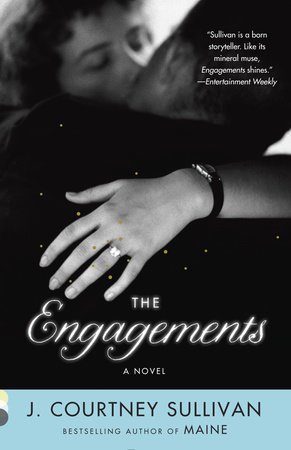The Engagements Reader’s Guide
By J. Courtney Sullivan


1. The Engagements’s epigraph refers to diamonds as “nothing more than an empty cage for our dreams-blank surfaces upon which the shifting desires of the heart could be written.” What does this tell us about the novel we’re about to discuss?
2. Feminism and the role of women is a recurring theme in The Engagements. Which character’s attitude did you relate to the most, and why?
3. Two of the novel’s major characters are anti-marriage, with story lines that are decades apart. How does time change society’s attitude toward intentionally unmarried women?
4. On page 27, Evelyn thinks, “Men made mistakes and when they asked forgiveness, women forgave. It happened every day.” Does this prove true throughout the novel, with other characters?
5. Did you know that Frances Gerety was a real person? How does that change your feelings about the character?
6. Why do you think Frances is the only character whose story moves through time?
7. On page 100, in a section set in 1972, Evelyn thinks, “Since she and Gerald were young, what it meant to be an American had changed. There was so much emphasis on the self now-self over country, self over family, self over all else. Her son was a shining example of the consequences.” How does this play out in more contemporary sections of the novel and with other story lines?
8. While the novel is clearly about marriage, parental relationships also play a major role. Discuss and compare the parenting styles of Evelyn, James, and Kate.
9. How does Delphine’s bond with her late father influence her romantic life?
10. In the novel, a Stradivarius violin and a diamond ring are each cherished heirlooms. Which do you think has more value? Which does the author value more?
11. What did you think about Delphine’s reaction to P.J.’s betrayal?
12. On page 175, Meg says to Frances, “Sometimes it just feels like we can’t tell what we’ve given up until it’s too late.” What other characters could have uttered that line?
13. Sullivan paints Kate as principled yet judgmental. Does Sullivan want us to like her?
14. On page 275, May says to Kate, “It’s very rare to find anyone who’s absolutely certain that she chose the right ring.” What metaphor is at work here?
15. Late in the novel, on page 344, Gerald says to Evelyn, “No one has the right to comment on the way anyone else falls in love.” He says that in 1972. How does it apply in other decades?
16. What did you think when you learned how James was connected to the other stories?
17. What point do you think Sullivan is making about the ethics of diamonds? Did reading this novel change your feelings about them?
18. Which story line did you enjoy the most? Whose story would you like to keep reading?
Just for joining you’ll get personalized recommendations on your dashboard daily and features only for members.
Find Out More Join Now Sign In